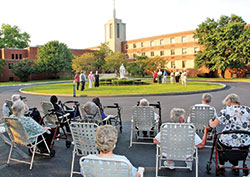Two federal inmates are executed in Terre Haute, additional two executions set for September

More than 20 Sisters of St. Benedict hold a prayer vigil outside Our Lady of Grace Monastery in Beech Grove on Aug. 25, prior to two federal executions that took place on Aug. 26 and 28 in Terre Haute. (Submitted photo)
By Natalie Hoefer
As the shadows lengthened on Aug. 25, more than 20 Sisters of St. Benedict processed solemnly outside Our Lady of Grace Monastery in Beech Grove.
As they processed, they intoned the words of a Taizé chant: “Jesus, remember me when you come into your kingdom.”
These words—said by the Good Thief to Christ during the crucifixion—served to open the religious sisters’ prayer vigil before two more federal executions took place at the Federal Correctional Complex in Terre Haute on Aug. 26 and 28—the fourth and fifth such executions in six weeks.
“We wanted to do something because this [carrying out of federal executions] is back in full force in our state,” said Benedictine Sister Mary Luke Jones, who participated in the service.
The prayerful gathering was held in front of a large statue of the Blessed Mother outside the monastery.
The service included Scripture, prayer and “a reflection based on the thoughts of St. Francis, and we read petitions then placed a candle for each one placed in front of Mary,” said Sister Mary Luke.
“We prayed for those on death row, for their victims, for our state, for those who must carry out the mandate of the state in Terre Haute, for the state of our nation and for the sacredness of life,” she said.
“Obviously we believe in the sacredness of all life, but it’s very difficult for me personally to not always remember the victims of these violent crimes.”
The first of the two men executed last week was Lezmond Mitchell on Aug. 26.
The Native American of the Navajo Nation was convicted of killing a woman and her 9-year-old granddaughter in 2001.
His execution was met with great resistance from the Navajo Nation, according to an Aug. 27 Catholic News Service article.
It quotes Krisanne Vaillancourt Murphy, executive director of Catholic Mobilizing Network, as stating, “As Catholics, we stand with our Native American brothers and sisters in mourning … .”
Prior to Mitchell’s execution, the article continues, Murphy said the federal execution “violates the Navajo Nation’s cultural values, serves as a manifestation of the racial oppression inflicted upon Native Americans for centuries in the United States, and devalues the sacred dignity of human life.”
The article notes that Catholic Mobilizing Network “organized a virtual prayer vigil [on] the afternoon of Aug. 26, where hundreds prayed for Mitchell, his victims, their loved ones, and all those impacted by his execution.”
The vigil was led in part by Bishop James S. Wall of Gallup, N.M., the diocese where Mitchell’s crime was committed. Bishop Wall serves as the chairman of Office of Native American Affairs for the United States Conference of Catholic Bishops (USCCB).
The second execution, which took place on Aug. 28, was of federal death-row inmate Keith Dwayne Nelson. He was sentenced to death for the 1999 kidnapping, sexual abuse and killing of a 10-year-old girl.
According to an Aug. 28 CNN report, the executed inmate’s attorneys said that “the execution of Keith Nelson did not make the world a safer place. Over the years, we have come to know Keith as someone who was different than the person who committed the horrible crime to which he admitted and plead guilty to in 2001.”
On Aug. 27, a joint statement in opposition to capital punishment was issued by Oklahoma City Archbishop Paul S. Coakley, chairman of the USCCB’s Committee on Domestic Justice and Human Development, and Kansas City, Kan., Archbishop Joseph F. Naumann, chairman of the USCCB’s Committee on Pro-Life Activities.
“The Church’s opposition to the death penalty is clear, and we have made many requests that the federal government should not resume these executions,” the statement reads.
“Yet, not only has the government done so, they have scheduled even more executions” to be carried out in Terre Haute—William LeCroy on Sept. 22 and Christopher Vialva on Sept. 24.
The statement notes that, “God created each of us in his image. This gives each person an irrevocable dignity, despite their sinfulness” (Gen. 1:26-27).
It also quotes the Gospel of John in the Scripture story of the woman about to be stoned for committing adultery.
“When the Pharisees wanted to put to death the adulterous woman, they put the question to Jesus in this way: ‘Now in the law, Moses commanded us to stone such women. So what do you say?’ (Jn 8:5)
“We must not forget the Lord’s answer! Remembering the Lord’s call for mercy, we renew our plea: stop these executions!” †
